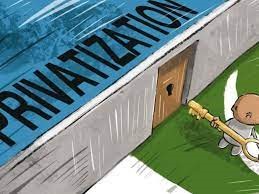INP-WealthPk
Adeem Niaz
Privatisation can help the government reduce its budget deficit by transferring the financial responsibility for certain assets or services from the public to the private sector, says Dr Malik Saqib Ali, an Assistant Professor and Head of Economics Department of the National University of Modern Languages (NUML), Islamabad. Speaking to WealthPK, however, he said there were also certain drawbacks in privatising the state-owned enterprises (SOEs).

He said privatisation of SOEs should enable the government to reduce its financial load as the private sector works more efficiently to make enterprises profitable. He continued by saying that private businesses might be more adaptable and quicker to respond to shifting market conditions and consumer demands, which leads to increased innovation. According to Saqib, privatisation can be successful only when the government considers the stakeholders based on their previous goodwill in the market rather than any influence, they enjoyed over the official decision making.
He said that the reason SOEs were not becoming profitable in Pakistan was that they were over-employed. “Every public entity that is not delivering is due to over-employment. This over-employment is fed by the government not the organisation, which is surely a burden on the country’s exchequer.” He said there should be no ministerial or bureaucratic influence on SOEs, specifically, when they hire human resources.
The NUML professor pointed out that the privatisation of the strategically important Pakistan Steel Mills (PSM) in 2006 was not a prudent decision as it was operating at its optimum capacity when it was privatised. “At the time of PSM privatisation, the value of its assets stood at more than Rs100 billion, including 4,546 acres of land, but it was sold for just 20% of its original value.”
The economic expert also highlighted that since private enterprises’ main objective is to maximise their profits, privatisation almost always leads to a higher rate of inflation. “Due to higher prices, only a particular segment of consumers will have access to goods and services, which will promote inequality in the society.”
“The country has had very bad experience with privatisation since it began in 1990,” Saqib said, stressing the need for the government to first provide the necessary infrastructure to the market to suit the needs of the private sector.” “The government should hire the best competitive human resources and give them the responsibility of the budget-making of institutions to improve their efficiency,” Saqib recommended.
He said that professionals should be accountable for whatever they do to ensure increased transparency and accountability in the provision of services. “It will help in increasing economic growth in the long-term.” “The government should proceed with the privatisation process without any influence of powerful groups in order to ease its fiscal burden. Powerful lobbies do put pressure on decisionmakers to decide in accordance with their own preferences every time privatisation of an SOE takes place, thus benefiting only the private owner and not the public at large,” Saqib highlighted.
Credit : Independent News Pakistan-WealthPk



